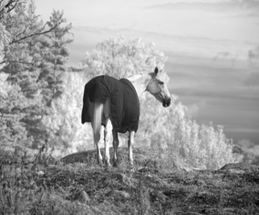Posted by Joyce Harman, DVM on Aug 2nd 2022
Is Your Horse Ready for Old Man Winter?
Tips for Wintertime Horse Care from retired veterinarian, Joyce Harman
Fall has descended upon most of the country and, though we might enjoy long, foliage-filled rides, it means Old Man Winter is just around the corner. With him, he brings stressed immune systems and wild weather patterns.
“Though winter can be a tough time for horse health, we can make small, preventative changes to keep our horses feeling their best,” said integrative and complementary veterinarian Dr. Joyce Harman, founder of Harmany Equine and Harmany Muzzles.
Mind the Digestive Tract
“The digestive tract contains two-thirds of the horse’s immune system, making it critical to short- and long-term health,” said Dr. Harman. “A change in the weather combined with the change in diet can add stress to the poorly designed system, which can not only prohibit optimal operation, but open the door to illness as well.”
–Ease the grass-to-hay transition. Stretching out the transition from grass to hay, or any other diet-related change, will be much less of a shock to your horse’s digestive tract.
–Use Probiotics. Not only do probiotics improve digestion and aid in gut health, but they also help your horse adjust to seasonal diet changes.
–Feed your horse the way he should be fed. On those freezing winter nights, it’s tempting to feed extra grain. However, the weather change alone is enough to stress the digestive tract—don’t compound that stress with even more processed feed! Feeding heavy grain meals causes large fluid shifts, acid-based shifts and changes in the bacteria in a horse’s digestive tract. Instead of stepping up the grain, offer more hay. Digesting hay actually warms the horse internally as heat is given off as part of the digestive process.
–Line up your hay source and plan accordingly. Don’t be the horse owner who runs out of hay in February, scrambling to find a new source! Remember, an average-sized horse can eat about 600 pounds of hay a month, and should be eating about 1-2 percent of his bodyweight each day in the winter. It’s easy to underestimate the amount of hay needed for the entire winter, but planning accordingly will mean no harsh hay transitions for your horses.
If you feed round bales, keep an eye on the easy keepers! It might be necessary to muzzle or feed a supporting supplement, like Dr. Harman’s hemp meal-based OB Formula, to keep the weight off.
Support the Immune System
There are a variety of holistic supplements that can help keep the immune system on track. This is especially important for older horses, horses that travel and those that are prone to flu-type illnesses.
Two supplements to check out are:
Chia Seeds. Chia seeds are rich in Omega-3 fatty acids, which support the immune system and the digestive system.
–Echinacea. Echinacea is a powerful immune system stimulant that helps keep respiratory infections and the flu at bay. It’s a good idea to incorporate Echinacea into your horse’s routine before shipping.
Don’t Forget the Basics
–Make sure he’s drinking. The risk of colic and illness increases with dehydration. Make sure your equine gets plenty to drink as the weather cools! You might consider providing salt or mixing a small amount of salt in their feed to promote drinking.
-Assess your horse. If you see your horse multiple times daily, you’re much less likely to notice unhealthy changes in his body until it’s too late. Consider using a weight tape every 10 to 14 days to ensure he remains at a healthy weight. If he’s losing weight, adjust his diet accordingly.
Remember that geriatric horses sometimes require special care, and not just an extra flake or two of hay! Be mindful of your horse’s comfort level, as well as movement, as older horses can stiffen up during the cold weather. You might explore a joint supplement, like Pernalogix Natural Joint Care, to keep him or her moving easily.

